Understanding Gallstones: How They Affect Your Gallbladder | Alfa Gastro and Liver Care

Gallstones are a common yet often overlooked health issue that can significantly impact the gallbladder, an organ essential for digestion. Here, Dr. Vatsal Mehta from Alfa Gastro and Liver Care explains what gallstones are, how they form, their symptoms, causes, and the best ways to manage and prevent them.
What Are Gallstones?
Gallstones are solid particles that develop in the gallbladder. They vary in size from as small as a grain of sand to as large as a golf ball. There are two primary types of gallstones:
- Cholesterol Gallstones: These are the most common type, formed from hardened cholesterol. Despite their name, they aren’t related to cholesterol levels in the blood.
- Pigment Gallstones: These are smaller and darker, made from bilirubin, a substance produced from the breakdown of red blood cells.
How Do Gallstones Form?
Gallstones form when there is an imbalance in the substances that make up bile, the digestive fluid produced by the liver. Factors contributing to this imbalance include:
- Excess Cholesterol: When the liver secretes more cholesterol than bile can dissolve, the excess can crystallize and form stones.
- Bilirubin Imbalance: Certain conditions cause the liver to produce too much bilirubin, leading to the formation of pigment gallstones.
- Bile Concentration: If the gallbladder doesn’t empty properly, bile can become overly concentrated, promoting stone formation.
Symptoms of Gallstones
Many people with gallstones don’t experience symptoms and may not know they have them. However, when a gallstone blocks a bile duct, it can cause severe pain and other symptoms, such as:
- Intense Abdominal Pain: Often sudden and severe, typically in the upper right abdomen.
- Back Pain: Pain can radiate to the right shoulder or back.
- Nausea and Vomiting: These often accompany the pain.
- Jaundice: Yellowing of the skin and eyes if a stone blocks the bile duct.
- Fever and Chills: Indicate an infection in the bile duct or gallbladder.
Causes and Risk Factors
Several factors increase the risk of developing gallstones:
- Genetics: Family history of gallstones.
- Obesity: Excess weight increases cholesterol levels in bile.
- Diet: High-fat, high-cholesterol, and low-fiber diets.
- Age and Gender: Gallstones are more common in people over 40 and women.
- Medical Conditions: Diabetes, liver cirrhosis, and certain blood disorders.
- Rapid Weight Loss: Quick weight loss can disrupt bile balance.
Managing and Preventing Gallstones
Dietary Changes:
- Increase Fiber Intake: Fruits, vegetables, and whole grains.
- Healthy Fats: Incorporate healthy fats like olive oil and fish oils.
- Moderate Coffee Consumption: Some studies suggest coffee might help prevent gallstones.
Regular Exercise:
- Physical activity helps maintain a healthy weight and reduces gallstone risk.
Medical Treatments:
- Medications: Certain drugs can dissolve cholesterol gallstones.
- Surgery: Cholecystectomy, the surgical removal of the gallbladder, is often recommended for symptomatic gallstones.
Hydration:
- Drink plenty of water to help maintain the proper bile consistency.
Conclusion
Gallstones can pose a significant health risk if not managed properly. Understanding their causes, symptoms, and preventive measures can help maintain gallbladder health and overall well-being. For personalized advice and comprehensive treatment options, consult Dr. Vatsal Mehta at Alfa Gastro and Liver Care.
For more information on gallstones and gallbladder health, visit Alfa Gastro and Liver Care or schedule an appointment with Dr. Vatsal Mehta today.
